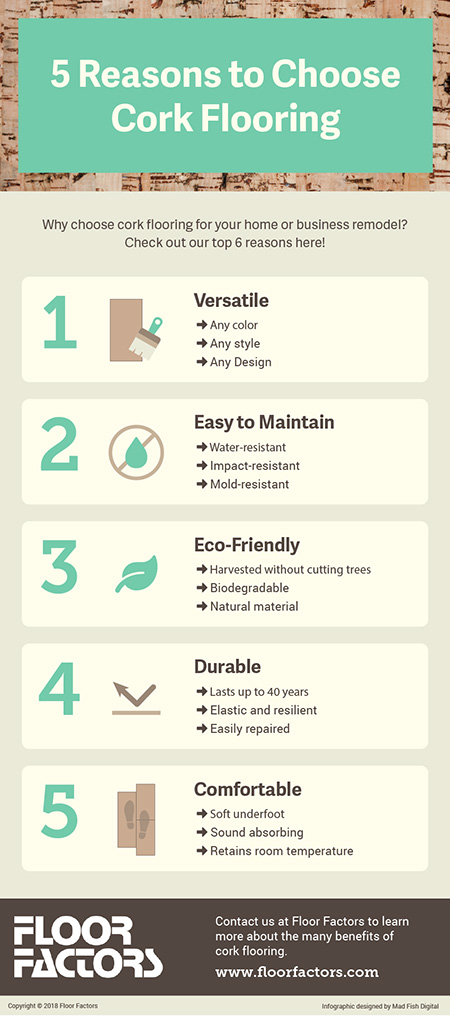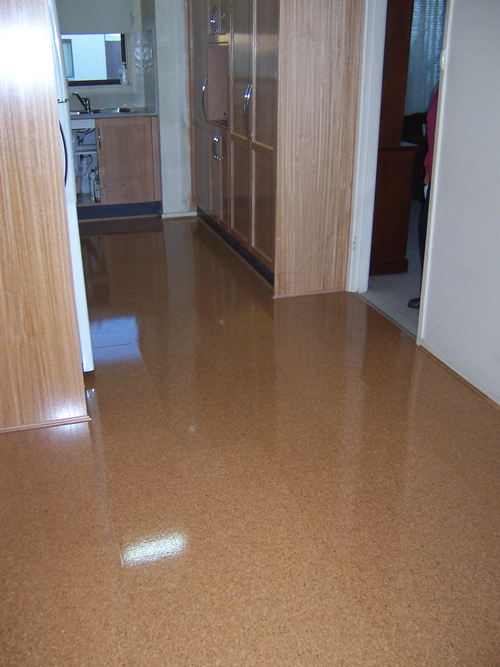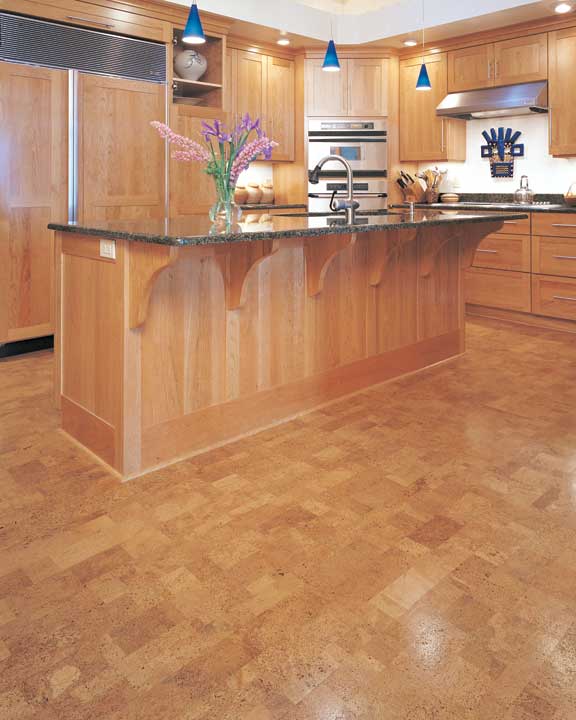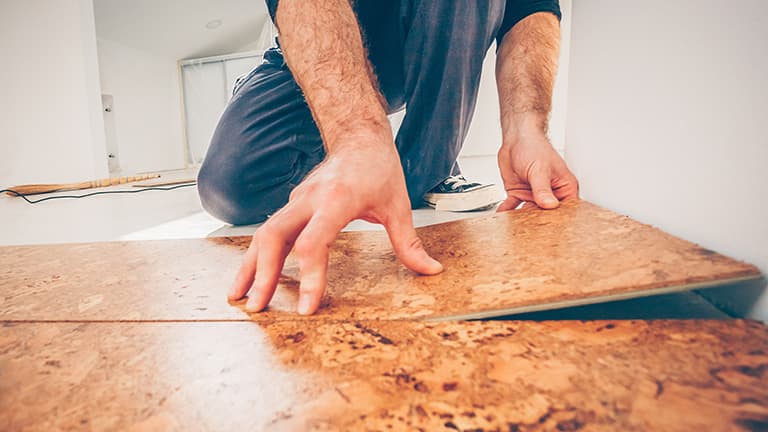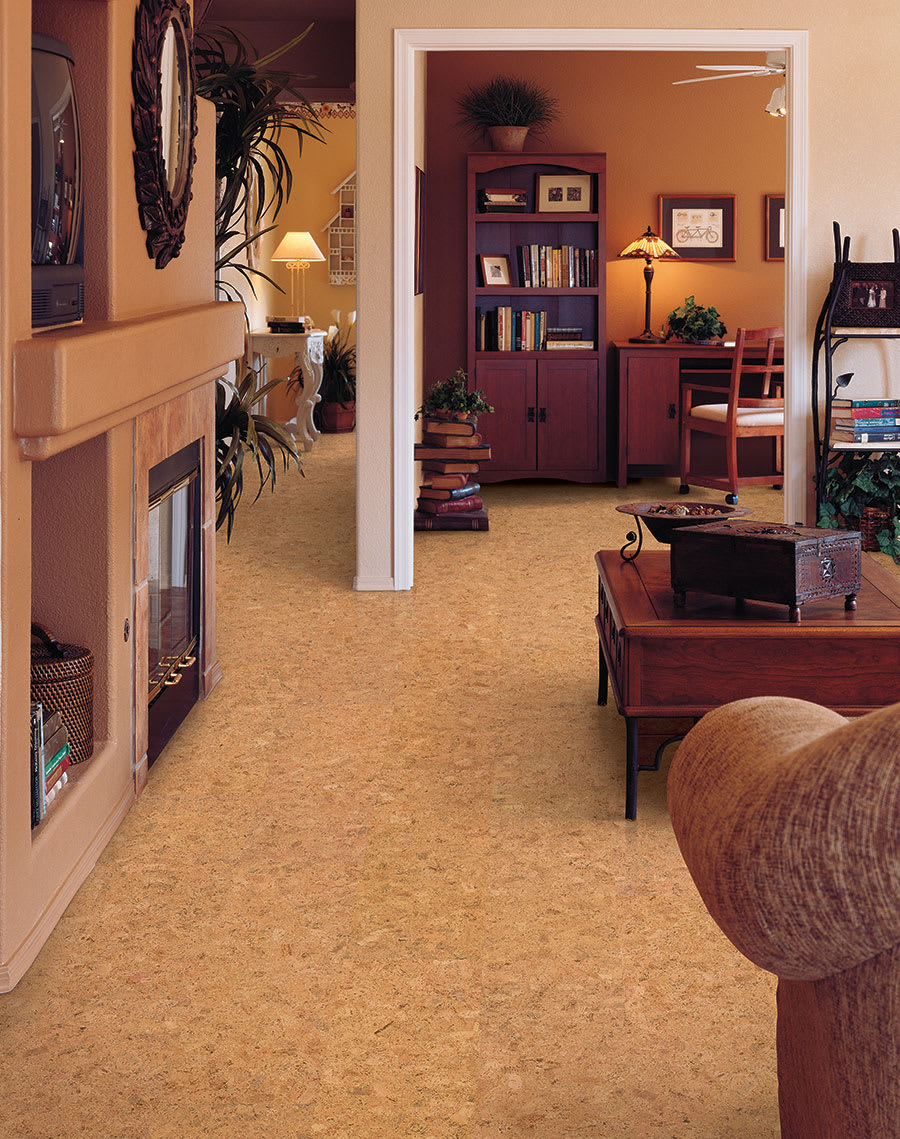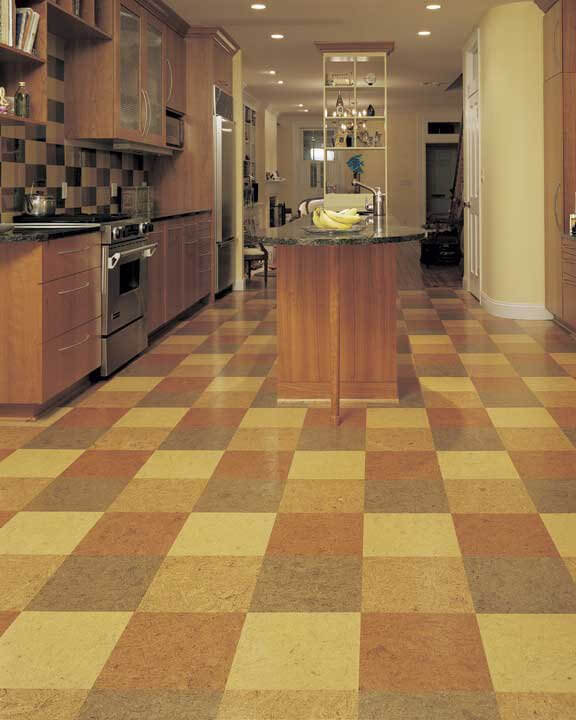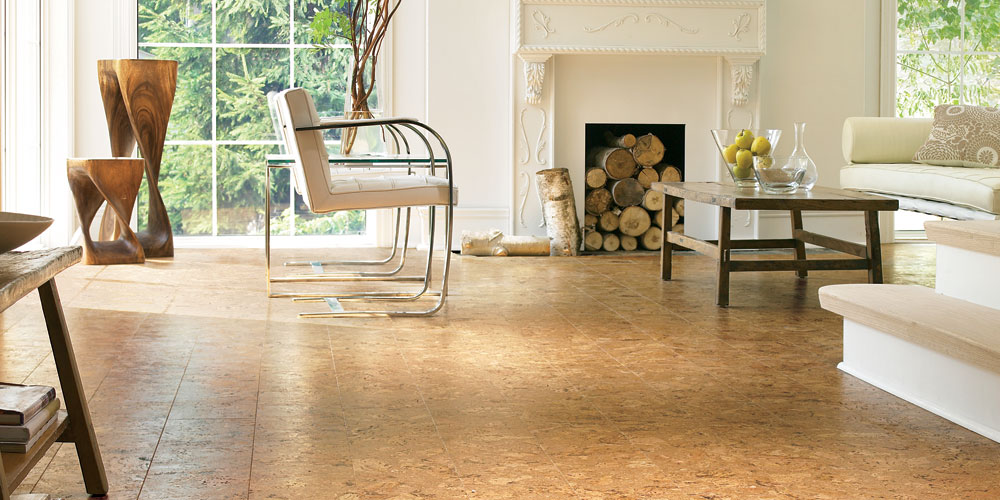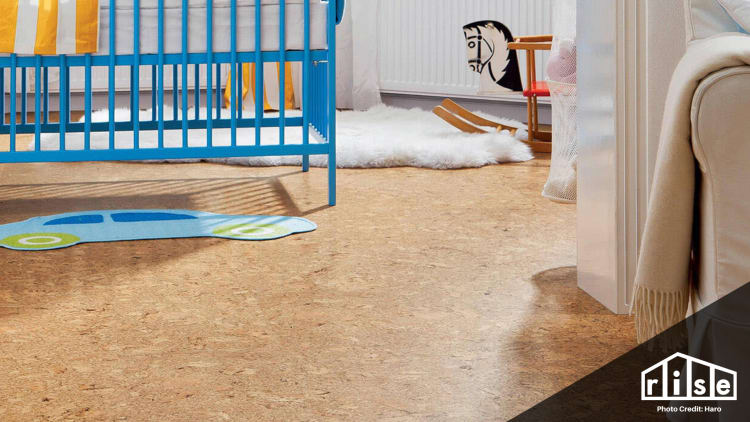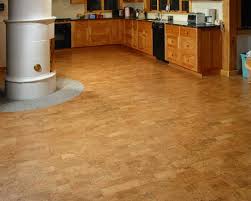Eco-Friendly and Sustainable Material
Cork flooring has gained popularity in recent years due to its eco-friendly and sustainable characteristics. Derived from the bark of cork oak trees, this flooring material is harvested in a way that promotes the tree’s health and longevity. Here are several reasons why cork flooring is an environmentally conscious choice for your home:
- Renewable Resource: Cork oak trees are not cut down during the harvesting process. Instead, only the outer bark is carefully stripped away, allowing the tree to regenerate its bark over time. This sustainable harvesting method ensures that cork forests remain intact and continue to thrive.
- Minimal Environmental Impact: The production of cork flooring involves minimal processing and energy consumption compared to other flooring materials. Additionally, cork forests play a crucial role in carbon sequestration, helping to mitigate climate change by absorbing carbon dioxide from the atmosphere.
- Biodegradable and Recyclable: At the end of its life cycle, cork flooring can be easily recycled or biodegraded, reducing its environmental footprint. Unlike synthetic flooring materials that contribute to landfill waste, cork is a natural material that can be returned to the earth without harm.
- Low VOC Emissions: Volatile organic compounds (VOCs) are harmful chemicals often found in building materials, including flooring. Cork flooring, however, has low VOC emissions, making it a healthier choice for indoor air quality. This is particularly beneficial for individuals with respiratory sensitivities or allergies.
- Sustainable Cork Harvesting Practices: Cork oak trees have a lifespan of up to 200 years, and their bark can be harvested approximately every nine to twelve years without causing harm to the tree. This sustainable harvesting practice ensures the long-term viability of cork forests and supports rural communities that rely on cork production for their livelihoods.
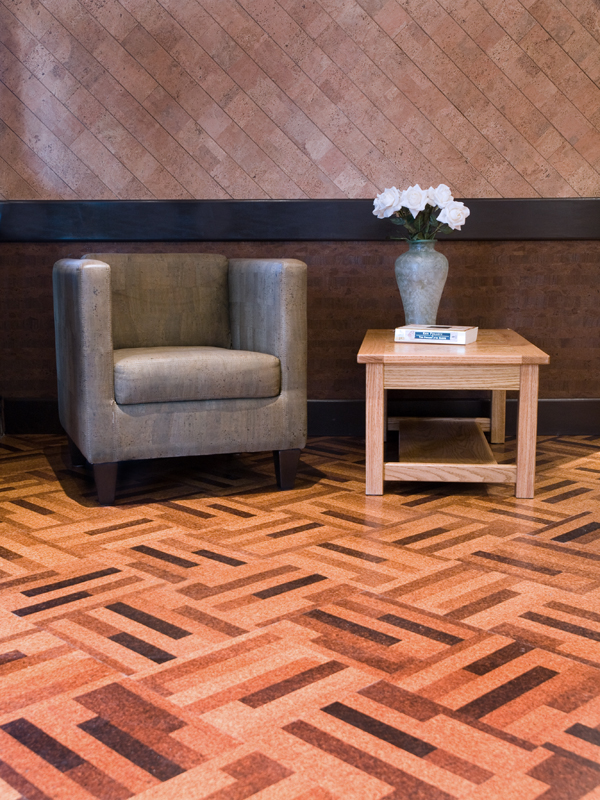
Comfort and Insulation Properties
Cork flooring is renowned for its exceptional comfort and insulation properties, making it a preferred choice for homeowners seeking a cozy and energy-efficient flooring solution. From its natural cushioning effect to its thermal and acoustic insulation capabilities, cork flooring offers a range of benefits that enhance comfort and livability in any space. Here’s why cork flooring is a top contender for comfort and insulation:
Natural Cushioning: One of the most notable features of cork flooring is its natural cushioning effect. The cellular structure of cork contains millions of air-filled pockets, giving it a soft and resilient texture underfoot. This cushioning effect provides comfort and support, making cork flooring an ideal choice for areas where people stand for extended periods, such as kitchens or laundry rooms.
Thermal Insulation: Cork flooring is an excellent thermal insulator, helping to regulate indoor temperatures and reduce energy consumption. Its cellular structure traps air, creating a barrier that prevents heat loss during colder months and heat gain during warmer months. As a result, cork flooring helps maintain a comfortable indoor environment year-round while reducing heating and cooling costs.
Acoustic Insulation: In addition to thermal insulation, cork flooring excels in acoustic insulation, minimizing sound transmission between floors and rooms. The cellular structure of the cork absorbs sound waves, reducing noise and echoing within the space. This makes cork flooring an ideal choice for bedrooms, home offices, and other areas where noise reduction is desired.
Anti-Static Properties: Unlike some flooring materials that can generate static electricity, cork flooring has natural anti-static properties. This means it does not attract dust or pet hair as readily, contributing to a cleaner and more hygienic indoor environment. Additionally, cork flooring is resistant to mold and mildew growth, further enhancing its comfort and durability.
Warm and Inviting Aesthetic: Beyond its functional benefits, cork flooring adds warmth and character to any room with its natural beauty and warm tones. Whether installed as traditional cork tiles or modern cork planks, this versatile flooring option complements a variety of interior styles, from contemporary to rustic. Its unique grain patterns and earthy hues create a welcoming ambiance that enhances the overall comfort of the space.
Durability and Resilience
Cork flooring is prized for its durability and resilience, making it a practical and long-lasting flooring choice for residential and commercial spaces alike. Despite its soft and cushioned feel, cork flooring is remarkably durable and capable of withstanding the rigors of daily wear and tear. Here are several reasons why cork flooring is renowned for its durability and resilience:
Natural Resilience: The cellular structure of a cork consists of tightly packed air-filled cells, giving it natural resilience and elasticity. This unique composition allows cork flooring to bounce back from indentations and compressions caused by heavy furniture or foot traffic, maintaining its original appearance and shape over time.
Impact Resistance: Cork flooring is inherently resistant to impact and pressure, making it a durable flooring option for high-traffic areas such as entryways, hallways, and living rooms. Its ability to absorb shock helps prevent damage from dropped objects or heavy impacts, resulting in a longer lifespan compared to other flooring materials.
Water Resistance: While cork flooring is not waterproof, it does possess natural water resistance due to the presence of suberin, a waxy substance found in cork cells. This inherent water resistance makes cork flooring suitable for areas prone to moisture exposure, such as kitchens and bathrooms. However, it’s essential to wipe up spills promptly and avoid standing water to prevent damage to the flooring.
Scratch and Scuff Resistance: Cork flooring is relatively resistant to scratches and scuffs, thanks to its durable surface layer and natural elasticity. While it may show signs of wear over time, regular maintenance and proper care can help minimize the appearance of scratches and maintain the flooring’s aesthetic appeal.
Longevity and Maintenance: With proper care and maintenance, cork flooring can last for decades, making it a cost-effective investment for homeowners. Routine cleaning and occasional resealing are recommended to preserve the flooring’s durability and appearance. Additionally, cork flooring can be sanded and refinished to remove surface imperfections and restore its original luster, further extending its lifespan.
Hypoallergenic and Easy to Maintain
Cork flooring is an excellent choice for individuals with allergies or respiratory sensitivities due to its hypoallergenic properties and ease of maintenance. Unlike carpeting, which can trap dust, pet dander, and other allergens, cork flooring provides a clean and hygienic surface that contributes to better indoor air quality. Here’s why cork flooring is hypoallergenic and easy to maintain:
Natural Resistance to Allergens: Cork flooring is naturally resistant to allergens such as dust, pollen, and pet dander, making it an ideal flooring option for allergy sufferers. Its smooth surface and tight cellular structure inhibit the accumulation of allergens, allowing for easier cleaning and maintenance. Additionally, cork flooring does not harbor dust mites, which are a common trigger for allergy symptoms.
Easy to Clean: Cork flooring is relatively low-maintenance and easy to clean with regular sweeping or vacuuming to remove dust and debris. For deeper cleaning, damp mopping with a mild detergent or cork-specific cleaner is recommended. Avoid using harsh chemicals or abrasive cleaners, as they can damage the flooring’s finish. With proper care, cork flooring retains its natural beauty and hypoallergenic properties for years to come.
Resistant to Mold and Mildew: Unlike some flooring materials that are susceptible to mold and mildew growth in damp environments, cork flooring is naturally resistant to mold and mildew due to its antimicrobial properties. This makes cork flooring an excellent choice for areas with high humidity, such as bathrooms and basements, where mold and mildew can be a concern.
Non-Toxic and Chemical-Free: Cork flooring is manufactured without the use of harmful chemicals or toxins, making it a safe and eco-friendly choice for indoor environments. Unlike vinyl or laminate flooring, which may emit volatile organic compounds (VOCs) and other harmful substances, cork flooring maintains indoor air quality and contributes to a healthier living space.
Hypoallergenic Benefits: Beyond its ease of maintenance, cork flooring offers hypoallergenic benefits that contribute to a healthier home environment. By reducing the presence of allergens and irritants, cork flooring helps alleviate allergy symptoms and respiratory issues, providing peace of mind for individuals with sensitivities.
Aesthetic Appeal and Versatile Design Options
Cork flooring is celebrated for its aesthetic appeal and versatile design options, offering homeowners a wide range of styles, colors, and patterns to suit their unique preferences and interior decor schemes. From traditional cork tiles to modern cork planks, this versatile flooring material adds warmth, texture, and visual interest to any room. Here’s why cork flooring is prized for its aesthetic appeal and design versatility:
Natural Beauty: Cork flooring showcases the natural beauty of cork with its distinctive grain patterns, warm tones, and organic texture. Each cork plank or tile features unique variations and imperfections, adding character and charm to the space. Whether installed in a traditional or contemporary setting, cork flooring enhances the overall aesthetic appeal of the room with its timeless beauty.
Warm and Inviting: With its warm and inviting appearance, cork flooring creates a cozy and welcoming ambiance in any room. Its natural earthy tones and soft texture complement a variety of interior styles, from rustic farmhouse to modern minimalist. Whether used in living areas, bedrooms, or home offices, cork flooring adds a touch of warmth and comfort to the space.
Versatile Design Options: Cork flooring is available in a variety of styles, colors, and patterns to suit diverse design preferences and architectural styles. From classic cork tiles in traditional square or rectangular shapes to contemporary cork planks with unique textures and finishes, homeowners can choose from a wide range of design options to achieve their desired look.
Customization Possibilities: In addition to standard cork flooring options, homeowners can explore customization possibilities to create a truly unique and personalized space. Custom stains, finishes, and patterns allow for creative expression and individuality, allowing homeowners to tailor their flooring to match their specific vision and style.
Compatibility with Underfloor Heating: Cork flooring is compatible with underfloor heating systems, providing added comfort and warmth underfoot during colder months. The natural thermal insulation properties of cork enhance the efficiency of underfloor heating, creating a cozy and inviting environment while reducing energy consumption.
Cork Flooring: What Are the Pros & Cons?
Advantages Of A Cork Floating Floor Over Glue-Down Cork Tiles
Pros and Cons of Cork Flooring – Is It Right for You?
Advantages of Cork Flooring
Cork Flooring Pros and Cons
BENEFITS OF CORK FLOORING – Outer Banks Floor Covering
The Benefits of Cork Flooring
Cork Flooring Advantages and Disadvantages – HomeAdditionPlus.com
Cork Flooring Pros and Cons Americas Floor Source
Related Posts:
